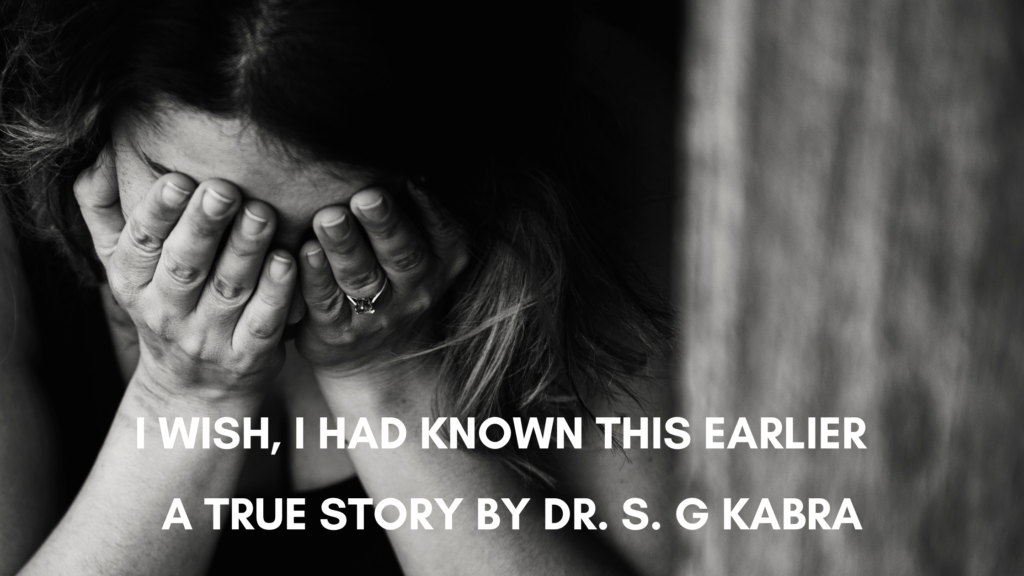Health & Wellness, Home Care
I Wish, I Had Known This Earlier – by Dr. S. G Kabra
I Wish, I Had Known This Earlier – A True story written by Dr. S. G. Kabra
My cell phone buzzed. I responded. “Hello?”
“Hello.” It was a lady’s voice at the other end. “May I speak to Dr. Kabra please?”
“This is Dr. Kabra.”
“Dr.S.G.Kabra?”
“Yes.”
“Doctor Sahib, I am Mrs. Solanki from Bhatinda.”
“Yes, Mrs. Solanki.”
“Can I speak to you for a few minutes?”
“About what?”
“About your article on home pesticides in the recent issue of a magazine; it’s your article, isn’t it?”
“If you are talking about the article in this week’s magazine, yes, it’s my article. What about it?”
“In the article you say that home pesticides may be fatal for a developing child in the early stage of pregnancy; the child may develop birth defects; or may get cancer. Is that right?”
I became cautious, rather defensive. This could be a journalist or possibly someone from the pesticide lobby out to worm information from me to use in a court of law, to challenge what I had written. I had to be careful about what I said. I mouthed my words slowly, “I have cited all the research studies that have found such a link. These studies have shown that a developing child in the womb is extremely sensitive and vulnerable to the ill effects of pesticides. Pesticides are a biological poison. In the first three months of pregnancy, when the child is being formed out of a shapeless mass of cells and quite rapidly, too, the possibility of harm is manifold. The researchers have mentioned specific pesticides which pose a threat.”
“But the child is deep inside the womb, covered by a water sac”, said Mrs. Solanki. “How do pesticides reach him?”
“In the same way as all other materials reach him, which is through the umbilical cord. A pregnant lady exposed to pesticides carries them in her blood.”
“You have also written that a toddler crawling on the floor come in contact with so called household pesticide residues on the floor. They are absorbed through the skin. So pesticides can therefore enter their bodies too. You state that children are more sensitive to the ill-effects of pesticides and also have a higher chance of suffering such ill-effects. Do these also include cancer?”
“Yes, cancer too. Studies have revealed that children in households using household pesticides have a higher incidence of blood cancer, brain cancer and a type of cancer called soft tissue sarcoma. Cancer from contact with pesticides has been scientifically studied. I have referenced and cited all such studies. You may go through all those studies if you need more information.”
To my great alarm, she started crying.
“Who will go through all these studies? Who should? The general public? Doctor Sahib, please… I am greatly upset after reading your article….I am ashamed of myself and filled with intense guilt.” Her voice choked and trailed. Between sobs, she whispered, “Please don’t get angry…”
I was quite shaken. “No! No! Mrs. Solanki. Pull yourself together. I am not angry. Whatever is there for me to get angry about? Now, now, settle down and tell me what happened. Why are you so upset? What have I written that has upset you?”
There was a long silence punctuated with sobs and sniffs. Then she asked, in a faltering voice, “you have written that herbicides and fungicides used in home gardens are particularly dangerous.”
“Yes, that is what the studies have revealed” I said, softly, still not quite comprehending where all this was leading to.
To my further surprise, she persisted in her interrogation, “At the end of your article you have listed five commonly used home pesticides, their use and harmful potential. Three of these, you state, are carcinogenic, meaning they have a high potential of causing cancer. Correct?”
“Y-e-s, this is what the researches reveal”, I repeated mildly.
Silence. More sobs.
“Hello….. Mrs. Solanki…? What is it that you are so upset about?”
Still sobbing she said, “Why didn’t you write earlier about what the research had revealed? Had you done that, my child would not have had blood cancer!”
I felt as if I had been hit by a battering ram. What was she saying?
“Did you say your child has cancer? Oh, I’m so sorry. How…?”
She sounded composed now. “It all started with cockroaches. Our house was full of them. It was awful”.
I was beginning to get the picture. “So you used a pesticide?”
“Yes. You know, the kind that can be sprayed…..so convenient and effective. When they were gone, I felt so happy and victorious in a way. Then I saw one again. I waited. Then there were two, then several. So I sprayed again. After that, I was using the spray with abandon, and, believing this was keeping them away, I used it even more. Pretty soon, I started using it against mosquitoes.”
“And then your child developed cancer?”
“Yes”. She started crying again. “My child, my baby, started getting weak and pale and started getting fever. They diagnosed a kind of blood cancer. There were tests, more tests, then the treatment…it was awful. I feel I have made my child suffer. I even used to tell the gardener to use all the pesticide he wanted to and, poor fellow, he would do so. And my child used to play outside and touch the flowers, pull the grass, roll on the lawn. Oh, my God, what have I done?”
“Mrs. Solanki, I am really sorry for you and your child. But it is possible that the cancer may not have been related to pesticide use”.
“But you yourself have said….”
“I know. These are statistics. What the studies and my article tries to say is that the risks of developing a cancer are much greater after pesticide contact but that does not necessarily mean that in a specific instance one could prove a cause-effect relationship.”
“You are saying that just to make me feel better”.
“Maybe I am, Mrs. Solanki. But what is the use of flogging yourself now? What has happened might not have been your fault. I realize that my article has caused you anguish but, believe me, that was not my intention. The purpose of writing what I have is to reduce the indiscriminate and casual use of pesticides. Obviously, you have been affected by what you read, though not in the way I would have wished. But let us look at the brighter side of things. I guess you won’t be using pesticides again”.
“Never, never again” said Mrs. Solanki emphatically. Maybe what happened to my child would have happened in any case. But I wouldn’t want it to happen to another child of mine or anyone else’s. Oh, doctor I want to again apologize for the way I spoke to you. I am grateful for your article and for the time you have taken today. You have been so patient….I..” She burst into tears again.
Dr.S.G.Kabra
15, Vijay Nagar, D-block, Malviya Nagar, Jaipur – 302017
Mobile: 8003516198

